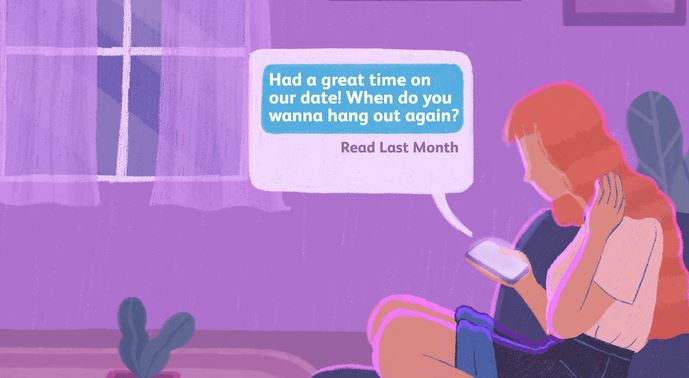The world of modern dating, where digital platforms have become a primary venue for meeting new people, the phenomenon of “ghosting” has taken root. Ghosting—suddenly cutting off all communication with someone without explanation—has profound psychological implications, often leaving the “ghostee” to grapple with feelings of confusion, self-doubt, and emotional pain. Unlike a direct goodbye, ghosting avoids the difficult but respectful act of ending a relationship, inflicting deeper, often long-lasting wounds.
The Rise of Ghosting in Digital Dating Culture
The term “ghosting” is now officially recognized in the dictionary and has become increasingly common, especially as digital platforms dominate the dating scene. With dating apps making it easy to connect, breakups can seem as simple as swiping left. But unlike tossing out a loaf of stale bread, ghosting someone without a courteous exit inflicts a harsh emotional toll on both the ghosted and the one doing the ghosting. Ghosting diminishes not only the self-esteem of the person left in the dark but can also erode the self-worth of the ghoster.
Encouraging Honesty in Modern Dating
Shannon, who runs two award-winning personal dating agencies in South Africa, emphasizes the importance of dignity and closure within her agency’s e-club. In her view, guiding daters to approach relationships with respect can foster a more positive experience for both parties. She shares,
“We’re encouraging daters to keep the momentum going with their current conversations or properly end off a conversation to give the person on the other side the closure they need.”
For those who may find it hard to directly end a relationship, she suggests reaching out to a dating coach for advice on how to exit gracefully. Providing closure, even when difficult, helps both parties retain their self-respect and enables the ghostee to move on without lingering doubts or unresolved pain. Shannon adds that, although a breakup might sting initially, the ghoster’s reputation suffers in the long run, leaving a negative and enduring impression.
The Psychological Impact of Being Ghosted
Despite its prevalence, ghosting is generally regarded as inconsiderate, leaving people with lasting emotional scars. It is a slow, painful process, unlike the sharp yet clean break of a traditional breakup. Being ghosted can leave one feeling haunted by uncertainty and despair, checking their phone obsessively in the hopes of a response that will never come. Shannon, who frequently supports clients through these experiences, notes,
“Many clients report experiencing anxiety, decreased self-esteem, as well as depressive symptoms,”
as they struggle to understand why they did not deserve an honest farewell. For many, the ambiguity of being ghosted is far more damaging than the end of the relationship itself.
Ghosting can also affect one’s ability to form new relationships. People who have been ghosted may become anxious when messages go unanswered, misinterpreting normal delays as signs of abandonment. Shannon explains,
“Being ghosted can create trust issues and fear of abandonment in future relationships. Clients may become more guarded and reluctant to open up emotionally, fearing that they might be ghosted again.”
Some become more desperate for reassurance, clinging to new partners out of fear, while others withdraw and develop a defensive barrier, making it harder to establish genuine connections. In either case, the damage caused by ghosting can linger, influencing future relationships in profound and complex ways.
Situations Where Ghosting May Be Justifiable
While ghosting is typically seen as hurtful, Shannon acknowledges that there are instances where it might be warranted. If someone is disrespectful, harassing, or does not respect boundaries after a relationship has been ended, it may be acceptable to cut ties without further contact. Similarly, after a brief or casual date that lacked chemistry, sending a brief text such as “I wish you well, goodbye” is often enough to avoid ghosting while still being considerate.
The reasons behind ghosting vary, but common motivations include fear of causing pain, a lack of emotional connection, or even avoidant attachment styles that make vulnerability challenging. For some, discomfort with confrontation and underdeveloped communication skills lead to ghosting, as they evade the awkwardness of an honest goodbye. Shannon encourages her clients to view ghosting as a reminder of potential mismatches in character and communication styles, allowing them to move forward with a clearer perspective on the situation.
A Broader Perspective on Ghosting and Self-Worth
Shannon believes that reframing the experience of being ghosted can help people see that the issue often lies not in themselves but in the other person’s inability to communicate openly. Recognizing this distinction can alleviate the feelings of shame or self-doubt that often accompany ghosting, allowing the ghosted person to rebuild their confidence and understand their own value.
“Clients have expressed feeling more clingy or desperate for reassurance in subsequent relationships, while others have expressed feeling even more detached and resistant to intimacy.”
Ultimately, having a supportive matchmaker or dating coach can help individuals navigate the complexities of modern dating. By guiding clients in the art of ending relationships respectfully and coaching them on healthier dating habits, Shannon and her team aim to promote a culture of honesty and empathy in an era where ghosting has become all too common.




